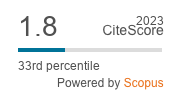| 1/2024 - 2 |
A New Parametric DFT-Based OFDM Transceiver for Intrinsic Wireless Communication EncryptionCHERGUI, L. |
| View the paper record and citations in |
| Click to see author's profile in |
| Download PDF |
Author keywords
communication systems security, discrete Fourier transform, encryption, OFDM, wireless communication
References keywords
ofdm(20), communications(18), systems(10), time(6), physical(6), layer(6), estimation(6), digital(6), channel(6), signal(5)
Blue keywords are present in both the references section and the paper title.
About this article
Date of Publication: 2024-02-29
Volume 24, Issue 1, Year 2024, On page(s): 15 - 22
ISSN: 1582-7445, e-ISSN: 1844-7600
Digital Object Identifier: 10.4316/AECE.2024.01002
Web of Science Accession Number: 001178765900002
SCOPUS ID: 85189662009
Abstract
In this paper, we propose a parametric OFDM transceiver for wireless communication encryption. One of the major contributions of this work is the intrinsic encryption nature of the proposed system, since it is a completely new idea and philosophically different from the concept of existing secured OFDM systems requiring separate encryption blocks. The main idea behind the proposed system is the appropriate use of the parametric discrete Fourier transform (DFT-alpha) and its inverse IDFT-alpha, where alpha is randomly obtained from [-2pi, 0], to implement the OFDM system and at the same time inherently encrypt the communications. Thus, the resulting (IDFT-alpha/DFT-alpha)-based OFDM transceiver, which has a performance similar to that of the conventional IDFT/DFT-based OFDM transceiver, is applied and implemented in the IEEE 802.11a WIFI system framework OFDM for communication encrypting. Moreover, using BER and SNR, we experimentally determine the appropriate intervals of the possible values of alpha for perfect encryption in a flat fading channel assumed for optimal testing environment. We also examine and assess the effects of DFT-alpha on the transformation of the constellation pattern of the transmitted signal to prove the validity of the obtained intervals for different modulation schemes such as BPSK, QPSK, 16QAM, and 64QAM. |
| References | | | Cited By «-- Click to see who has cited this paper |
| [1] J. K. Choi, V. D. Nguyen, H. N. Nguyen, V. V. Duong, T. H. Nguyen, H. Cho, H. K. Choi, S. G. Park, "A time-domain estimation method of rapidly time-varying channels for OFDM-based LTE-R systems," Digital Communications and Networks, Vol. 5, Iss. 2, pp. 94-101, 2019. [CrossRef] [Web of Science Times Cited 13] [SCOPUS Times Cited 13] [2] V. Vahidi, E. Saberinia, "OFDM for payload communications of UAS: channel estimation and ICI mitigation," IET Communications, Vol. 11, Iss. 15, pp. 2350-2356, 2017. [CrossRef] [Web of Science Times Cited 13] [SCOPUS Times Cited 14] [3] S. Kamal, C. A. Azurdia-meza, K. Lee, "Subsiding OOB emission and ICI power using iPOWER pulse in OFDM Systems,"Advances in Electrical and Computer Engineering, vol. 16, no. 1, pp. 79-86, 2016. [CrossRef] [Full Text] [Web of Science Times Cited 7] [SCOPUS Times Cited 8] [4] J. Kim, H. T. Anh, "Robust and low-complexity timing synchronization algorithm and its architecture for ADSRC applications," Advances in Electrical and Computer Engineering, vol. 9, no. 3, pp. 39-44, 2009. [CrossRef] [Full Text] [Web of Science Times Cited 1] [SCOPUS Times Cited 1] [5] T. M. Schmidl and D. C. Cox, "Robust frequency and timing synchronization for OFDM," in IEEE Transactions on Communications, vol. 45, no. 12, pp. 1613-1621, Dec. 1997. [CrossRef] [Web of Science Times Cited 2253] [SCOPUS Times Cited 3079] [6] S. Guo, Y. Fu, "A Time-Varying Chaotic Multitone Communication Method Based on OFDM for Low Detection Probability of Eavesdroppers," in IEEE Access, Vol. 9, pp. 107566-107573, 2021. [CrossRef] [Web of Science Times Cited 3] [SCOPUS Times Cited 7] [7] H. Li, X. Wang, Y. Zou, "Dynamic subcarrier coordinate interleaving for eavesdropping prevention in OFDM systems," in IEEE Communications Letters, Vol. 18, no. 6, pp. 1059-1062, 2014. [CrossRef] [Web of Science Times Cited 39] [SCOPUS Times Cited 43] [8] M. Sakai, H. Lin, K. Yamashita, "Intrinsic interference based physical layer encryption for OFDM/OQAM," in IEEE Communications Letters, Vol. 21, no. 5, pp. 1059-1062, 2017. [CrossRef] [Web of Science Times Cited 10] [SCOPUS Times Cited 12] [9] Z. Li, X. G. Xia, "A distributed differentially encoded OFDM scheme for asynchronous cooperative systems with low probability of interception," in IEEE Transactions on Wireless Communications, Vol. 8, no. 7, pp. 3372-3379, 2009. [CrossRef] [Web of Science Times Cited 28] [SCOPUS Times Cited 38] [10] G. Cheng, B. Yang, W. Xu, G. Cai, Z. Dai, "An anti-eavesdropping scheme based on OFDM-IM using artificial noise," in IEEE Signal Processing Letters., Vol. 30, pp. 1347-1351, 2023. [CrossRef] [Web of Science Times Cited 3] [SCOPUS Times Cited 3] [11] H. Li, X. Wang, W. Hou, "Secure transmission in OFDM systems by using time domain scrambling," 2013 IEEE 77th Vehicular Technology Conference (VTC Spring), Dresden, Germany, pp. 1-5, 2013. [CrossRef] [SCOPUS Times Cited 25] [12] P. Song, Z. Hu and C-K. Chan, "Multi-band chaotic non-orthogonal matrix-based encryption for physical-layer security enhancement in OFDM-PONs," in Journal of Optical Communications and Networking, vol. 15, no. 7, pp. C120-C128, July 2023. [CrossRef] [Web of Science Times Cited 4] [SCOPUS Times Cited 4] [13] P. Cao, X. Hu, J. Wu, L. Zhang, X. Jiang and Y. Su, "Physical layer encryption in OFDM-PON employing time-variable keys from ONUs," in IEEE Photonics Journal, vol. 6, no. 2, pp. 1-6, April 2014. [CrossRef] [Web of Science Times Cited 26] [SCOPUS Times Cited 22] [14] Y. Wu, Y. Yu, Y. Hu, Y. Sun, T. Wang and Q. Zhang, "Channel-based dynamic key generation for physical layer security in OFDM-PON systems," in IEEE Photonics Journal, vol. 13, no. 2, pp. 1-9, April 2021. [CrossRef] [Web of Science Times Cited 17] [SCOPUS Times Cited 20] [15] H. Wei, M. Cui, C. Zhang, T. Wu, H. Wen, Z. Zhang, Y. Chen, K. Qiu, "Chaotic key generation and application in OFDM-PON using QAM constellation points," Optics Communications, Volume 490, 2021. [CrossRef] [Web of Science Times Cited 8] [SCOPUS Times Cited 8] [16] Y. Shiu, S. Y. Chang, H. C. Wu, S. C. H. Huang and H. H. Chen, "Physical layer security in wireless networks: A tutorial," IEEE, Wireless Communications, vol.18, no.2, pp.66-74, Apr. 2011. [CrossRef] [Web of Science Times Cited 611] [SCOPUS Times Cited 726] [17] J. Zhang, A. Marshall, R. Woods and T. Q. Duong, "Design of an OFDM physical layer encryption scheme," in IEEE Transactions on Vehicular Technology, vol. 66, no. 3, pp. 2114-2127, March 2017. [CrossRef] [Web of Science Times Cited 53] [SCOPUS Times Cited 73] [18] S. Coleri, M. Ergen, A. Puri and A. Bahai, "Channel estimation techniques based on pilot arrangement in OFDM systems," in IEEE Transactions on Broadcasting, vol. 48, no. 3, pp. 223-229, Sept. 2002. [CrossRef] [Web of Science Times Cited 920] [SCOPUS Times Cited 1327] [19] H. Ye, G. Y. Li and B. H. Juang, "Power of deep learning for channel estimation and signal detection in OFDM systems," in IEEE Wireless Communications Letters, vol. 7, no. 1, pp. 114-117, Feb. 2018. [CrossRef] [Web of Science Times Cited 1096] [SCOPUS Times Cited 1424] [20] C. K. Jao, S. S. Long and M. T. Shiue, "On the DHT-based multicarrier transceiver over multipath fading channel," 2009 IEEE 20th International Symposium on Personal, Indoor and Mobile Radio Communications, Tokyo, Japan, pp. 1662-1666, 2009. [CrossRef] [Web of Science Times Cited 4] [SCOPUS Times Cited 5] [21] J. J. van de Beek, M. Sandell and P. O. Borjesson, "ML estimation of time and frequency offset in OFDM systems," in IEEE Transactions on Signal Processing, vol. 45, no. 7, pp. 1800-1805, July 1997. [CrossRef] [Web of Science Times Cited 1475] [SCOPUS Times Cited 1993] [22] O. Edfors, M. Sandell, J. J. van de Beek, S. K. Wilson and P. O. Borjesson, "OFDM channel estimation by singular value decomposition," in IEEE Transactions on Communications, vol. 46, no. 7, pp. 931-939, July 1998. [CrossRef] [Web of Science Times Cited 974] [SCOPUS Times Cited 1253] [23] S. Bouguezel, M. O. Ahmad and M. N. S. Swamy, "New parametric discrete Fourier and Hartley transforms, and algorithms for fast computation," in IEEE Transactions on Circuits and Systems I: Regular Papers, vol. 58, no. 3, pp. 562-575, March 2011. [CrossRef] [Web of Science Times Cited 22] [SCOPUS Times Cited 28] [24] T. Bekkouche and S. Bouguezel, "Digital double random amplitude image encryption method based on the symmetry property of the parametric discrete Fourier transform," in Journal of Electronic Imaging, vol. 27(2), pp. 023033-023033, March/April 2018. [CrossRef] [Web of Science Times Cited 9] [SCOPUS Times Cited 10] [25] R. W. Heath, Introduction to wireless digital communication: A signal processing perspective. PRENTICE HALL, pp. 333-336, 2017 [26] S. Haykin, M. Moher, Introduction to analog and digital communications. Second Edition. Wiley, pp. 395-396, 2010 [27] J. Proakis, M. Salehi, Digital communications. 5th Edition. McGraw-Hill, pp. 859-861, 2007 [28] J. Lu, K. B. Letaief, J. C. I. Chuang and M. L. Liou, "M-PSK and M-QAM BER computation using signal-space concepts," in IEEE Transactions on Communications, vol. 47, no. 2, pp. 181-184, Feb. 1999. [CrossRef] [Web of Science Times Cited 276] [SCOPUS Times Cited 348] [29] S. Bernard, Digital communications. Fundamentals and applications. Second Edition. Prentice Hall, pp. 209-218, 2012 [30] P. K. Vitthaladevuni and M. S. Alouini, "A recursive algorithm for the exact BER computation of generalized hierarchical QAM constellations," in IEEE Transactions on Information Theory, vol. 49, no. 1, pp. 297-307, Jan. 2003. [CrossRef] [Web of Science Times Cited 151] [SCOPUS Times Cited 169] [31] Y. S. Cho, J. Kim, W. Y. Yang, C. G. Kang, MIMO-OFDM wireless communications with MATLAB. Wiley, pp. 28-30, 2010 Web of Science® Citations for all references: 8,016 TCR SCOPUS® Citations for all references: 10,653 TCR Web of Science® Average Citations per reference: 251 ACR SCOPUS® Average Citations per reference: 333 ACR TCR = Total Citations for References / ACR = Average Citations per Reference We introduced in 2010 - for the first time in scientific publishing, the term "References Weight", as a quantitative indication of the quality ... Read more Citations for references updated on 2024-10-21 23:13 in 175 seconds. Note1: Web of Science® is a registered trademark of Clarivate Analytics. Note2: SCOPUS® is a registered trademark of Elsevier B.V. Disclaimer: All queries to the respective databases were made by using the DOI record of every reference (where available). Due to technical problems beyond our control, the information is not always accurate. Please use the CrossRef link to visit the respective publisher site. |
Faculty of Electrical Engineering and Computer Science
Stefan cel Mare University of Suceava, Romania
All rights reserved: Advances in Electrical and Computer Engineering is a registered trademark of the Stefan cel Mare University of Suceava. No part of this publication may be reproduced, stored in a retrieval system, photocopied, recorded or archived, without the written permission from the Editor. When authors submit their papers for publication, they agree that the copyright for their article be transferred to the Faculty of Electrical Engineering and Computer Science, Stefan cel Mare University of Suceava, Romania, if and only if the articles are accepted for publication. The copyright covers the exclusive rights to reproduce and distribute the article, including reprints and translations.
Permission for other use: The copyright owner's consent does not extend to copying for general distribution, for promotion, for creating new works, or for resale. Specific written permission must be obtained from the Editor for such copying. Direct linking to files hosted on this website is strictly prohibited.
Disclaimer: Whilst every effort is made by the publishers and editorial board to see that no inaccurate or misleading data, opinions or statements appear in this journal, they wish to make it clear that all information and opinions formulated in the articles, as well as linguistic accuracy, are the sole responsibility of the author.





